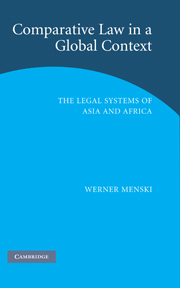Book contents
- Frontmatter
- Contents
- Preface and acknowledgments
- Table of cases
- Table of statutes
- List of abbreviations
- PART I Comparative framework
- Introduction: Globalisation and Asian and African legal systems
- 1 Comparative law and legal theory from a global perspective
- 2 Legal pluralism
- 3 Comparative jurisprudence: images and reflections of law
- PART II Regional comparisons in a global context
- Conclusion: towards global legal realism
- References
- Index
3 - Comparative jurisprudence: images and reflections of law
Published online by Cambridge University Press: 09 November 2009
- Frontmatter
- Contents
- Preface and acknowledgments
- Table of cases
- Table of statutes
- List of abbreviations
- PART I Comparative framework
- Introduction: Globalisation and Asian and African legal systems
- 1 Comparative law and legal theory from a global perspective
- 2 Legal pluralism
- 3 Comparative jurisprudence: images and reflections of law
- PART II Regional comparisons in a global context
- Conclusion: towards global legal realism
- References
- Index
Summary
The previous chapters confirmed that legal academics are still struggling to free themselves from the shackles of ‘black letter’ traditions (Cownie, 2004) and ‘black box’ approaches (Twining, 2000). Given that ‘one of the main jobs of jurisprudence is the critical exploration and evaluation of prevailing assumptions underlying legal discourse – both law talk and talk about law’ (Twining, 2000: 12), a radical reappraisal of old-established Western concepts and assumptions of legal theory in the light of globality-consciousness and sensitivity to legal pluralism is needed. Indeed, ‘it is clear that if legal theory is to engage seriously with globalisation and its consequences a critical re-examination of its agenda, its heritage of ideas, and its conceptual tools is called for’ (Twining, 2000: 10).
Such critical re-examination of global validity must demonstrate that general jurisprudence is more than a Western phenomenon. All around the world, different legal cultures have developed their own ways of ‘law talk and talk about law’, which a plurality-conscious global jurisprudence must account for. Observing that globalisation has already stimulated major rethinking in many fields, Twining (2000: 50) argues that ‘jurisprudence has so far responded only patchily to these challenges, but that the prospects for a sustained response are better than might appear on the surface’. Sharing Twining's optimism, I hope to have shown through the previous chapters that significant progress has already been made in conceptualising legal pluralism and globality-consciousness in law.
- Type
- Chapter
- Information
- Comparative Law in a Global ContextThe Legal Systems of Asia and Africa, pp. 129 - 190Publisher: Cambridge University PressPrint publication year: 2006

